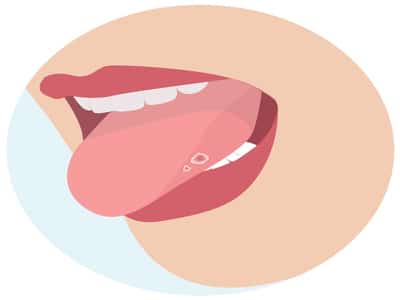
In This Post, We’ll Cover
- Do Braces Cause Canker Sores?
- What Causes Canker Sores?
- Preventing Canker Sores
- How to Get Rid of Canker Sores
Do Braces Cause Canker Sores?
No – there is no evidence that braces cause canker sores. Usually, people who experience canker sores with braces or any other orthodontic appliances are already prone to getting them before orthodontic treatment.
Braces are a new set of metal and wires your mouth must adjust to, which can trigger canker sores. Patients may experience an increase in sores because their mouth is adjusting to a big change when beginning orthodontic treatment. Braces can irritate oral tissue, which leaves it vulnerable to little lesions such as canker sores.
What Causes Canker Sores?
So, why do you keep getting canker sores? Though the exact causes of canker sores in children are unknown, many things can trigger their recurrence. Stress, tissue damage in the mouth, poor nutrition, certain foods, viruses, or bacteria are just some of the potential triggers of an ulcer.
Common triggers of canker sores are stress, tissue injury, acidic foods, and sickness. Stress is known to weaken your immune system, which makes it easier for canker sores to form. Make sure you’re keeping your stress at a healthy level to avoid canker sores. Cuts or scrapes inside of your mouth make you more vulnerable to canker sores. Any lesions from braces or sharp foods could lead to sores.
Avoid foods that are high in acidities such as lemons, pineapples, and tomatoes, as they can trigger canker sores. Additionally, you have a higher chance of getting a canker sore when the infection is present in your body
Canker sores last for about a week, and can occur on the gums, tongue, or along the back of the mouth. But, by avoiding triggers, you should be able to cut down on how many pop up!
Preventing Canker Sores
Preventing canker sores can be as simple as avoiding the triggers we discussed above. Using braces wax to avoid lesions, avoiding acidic foods, and avoiding other triggers like stress can all help. You can also alter your oral health practices, for example, switching to a toothpaste that does not contain sodium lauryl sulfate can help keep sores at bay. As always, keeping up good oral health will only help! But, because doctors don’t know why certain people get canker sores, most of the treatments they can offer you are curative rather than preventative. It’s best to work to keep good oral health to prevent these pesky sores.
How to Get Rid of Canker Sores
To relieve the pain of canker sores, you can rinse your mouth with warm saltwater, and get plenty of rest. It helps to get sleep, floss, stay hydrated, and stick to soft and cold foods. In some cases, you may want to take an over-the-counter pain reliever, similar to that which you’d take when you have a headache.
If your canker sores are persisting, be sure to speak to your orthodontist to see if there is anything else they can do to help. They may be able to offer antibacterial washes, clinical rinses, or gels that can provide you with relief.